(完整word版)人教版九年级英语unit3知识点及习题,推荐文档.docx
(完整word版)人教版九年级英语unit3知识点及习题,推荐文档
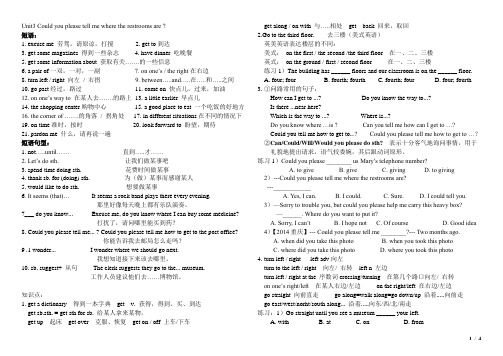
Unit3 Could you please tell me where the restrooms are ?短语:1. excuse me 劳驾,请原谅,打搅2. get to到达3. get some magazines 得到一些杂志4. have dinner 吃晚餐5. get some information about 获取有关…….的一些信息6. a pair of一双,一对,一副7. on one’s / the right在右边8. turn left / right 向左/ 右拐9. between…..and…..在…..和…..之间10. go past经过,路过11. come on 快点儿,过来,加油12. on one’s way to 在某人去…….的路上13. a little earlier 早点儿14. the shopping center购物中心15. a good place to eat 一个吃饭的好地方16. the corner of …….的角落/ 拐角处17. in different situations在不同的情况下19. on time准时,按时20. look forward to 盼望,期待21. pardon me 什么,请再说一遍短语句型:1. not…..until…… 直到…..才……2. Let’s do sth. 让我们做某事吧3. spend time doing sth. 花费时间做某事4. thank sb. for (doing) sth. 为(做)某事而感谢某人5. would like to do sth. 想要做某事6. It seems (that)…It seems a rock band plays there every evening.那里好像每天晚上都有乐队演奏。
7___ do you know... Excuse me, do you know where I can buy some medicine?打扰了,请问哪里能买到药?8. Could you please tell me... ? Could you please tell me how to get to the post office?你能告诉我去邮局怎么走吗?9 .1 wonder... I wonder where we should go next.我想知道接下来该去哪里。
人教版九年级英语unit3-讲解和练习

Unit 3: Teenagers should be allowed to choose their own clothes.【重点短语】take the test 参加考试pass the test 通过考试fail a test 考试失败be strict with+人对某人严格be strict in+事物对某事要求严格stay up 熬夜clean up 打扫整理learn from each other 互相学习concentrate on 专注于one’s own 某人自己的the other day 前几天,几天前= a few days ago have an opportunity to do sth.有机会做某事=have a chance to do/ of doingevery other day每隔一天(每两天)= every two daysat present 现在,目前in this way 用这种方法in the way 挡道的,妨碍人的on the way 在路上on one’s way to 在某人去…的路上by the way 顺便说(问)be serious about 对…认真care for在乎、关心【语言点】1. Teenagers should be allowed to choose their own clothes.应该允许青少年选择自己的衣服。
allow允许allow + n. 允许某事如:我们不允许这样的事(发生)allow sb. to do sth. 允许某人做某事(主动语态)如:妈妈允许我每晚看电视。
allow doing sth. 允许做某事如:They don't allow smoking here.be allowed to do sth. 被允许做某事(被动语态)如:莉莉被允许去青岛。
2.I don’t think sixteen-year-olds should be allowed to drive.宾语从句中否定转移:若宾语从句跟在think, believe等表示“想,认为"的动词之后,而主语为第一人称时,句子的否定体现在主句上。
新人教版九年级unit3核心知识点解读
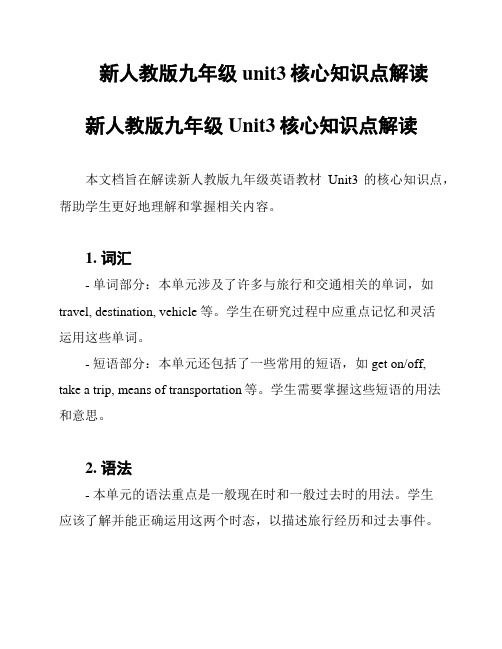
新人教版九年级unit3核心知识点解读新人教版九年级Unit3核心知识点解读本文档旨在解读新人教版九年级英语教材Unit3的核心知识点,帮助学生更好地理解和掌握相关内容。
1. 词汇- 单词部分:本单元涉及了许多与旅行和交通相关的单词,如travel, destination, vehicle等。
学生在研究过程中应重点记忆和灵活运用这些单词。
- 短语部分:本单元还包括了一些常用的短语,如get on/off, take a trip, means of transportation等。
学生需要掌握这些短语的用法和意思。
2. 语法- 本单元的语法重点是一般现在时和一般过去时的用法。
学生应该了解并能正确运用这两个时态,以描述旅行经历和过去事件。
- 另外,本单元还涉及了一些其他语法知识,如形容词比较级和最高级的用法,以及时间状语从句的引导词when和before的用法。
3. 阅读技巧- 本单元的阅读部分包含了一篇旅行日记和一篇介绍旅行方式的文章。
学生在阅读时应注意理解文章的主旨和要点,以及从上下文中推测词义和理解隐含信息的能力。
4. 口语表达- 本单元设有口语练环节,学生可以通过角色扮演和对话练等方式提高口语表达能力。
在练口语时,学生应注意正确运用本单元的词汇和语法知识。
5. 写作技巧- 本单元的写作任务要求学生写一篇关于自己最喜欢的交通工具的文章。
学生需要运用所学的语言知识和写作技巧,如使用形容词和副词进行描述,并注意句子的连贯性和语法准确性。
以上是对新人教版九年级Unit3核心知识点的简要解读。
希望学生能通过学习和练习,掌握这些知识点,提升英语学习的能力和水平。
新人教版九年级unit3知识点概述
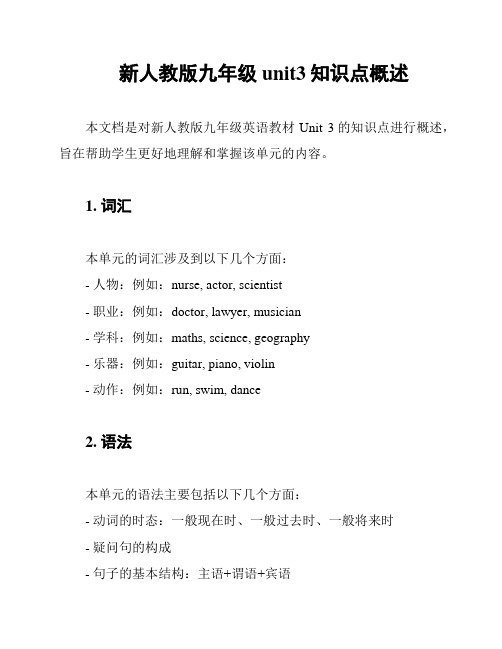
新人教版九年级unit3知识点概述
本文档是对新人教版九年级英语教材Unit 3的知识点进行概述,旨在帮助学生更好地理解和掌握该单元的内容。
1. 词汇
本单元的词汇涉及到以下几个方面:
- 人物:例如:nurse, actor, scientist
- 职业:例如:doctor, lawyer, musician
- 学科:例如:maths, science, geography
- 乐器:例如:guitar, piano, violin
- 动作:例如:run, swim, dance
2. 语法
本单元的语法主要包括以下几个方面:
- 动词的时态:一般现在时、一般过去时、一般将来时
- 疑问句的构成
- 句子的基本结构:主语+谓语+宾语
3. 句型
本单元主要研究了以下几种句型:
- What do you want to be when you grow up?
- I want to be a...
- Why do you want to be a...?
4. 文化背景
本单元涉及到一些与职业和学科相关的文化背景,例如不同国
家的职业分布和教育体系差异。
5. 阅读理解
本单元的阅读理解部分主要针对学生的阅读理解能力进行训练,通过阅读文章并回答问题,提高学生的阅读理解能力和批判思维能力。
总结
本文档对新人教版九年级英语教材Unit 3的知识点做了简要概述。
通过掌握这些知识,学生将能够更好地运用英语谈论职业和学科,并提高阅读和理解能力。
人教版九年级英语unit3知识点及习题(K12教育文档)
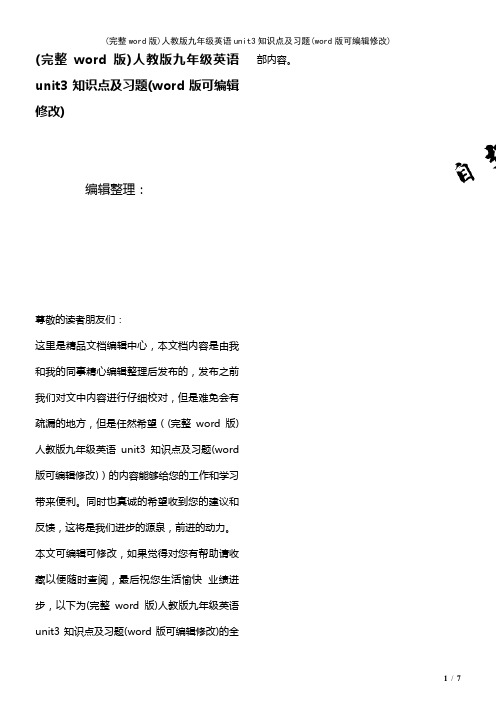
(完整word 版)人教版九年级英语unit3知识点及习题(word 版可编辑修改)1 / 7(完整word 版)人教版九年级英语unit3知识点及习题(word 版可编辑修改)编辑整理:尊敬的读者朋友们:这里是精品文档编辑中心,本文档内容是由我和我的同事精心编辑整理后发布的,发布之前我们对文中内容进行仔细校对,但是难免会有疏漏的地方,但是任然希望((完整word 版)人教版九年级英语unit3知识点及习题(word 版可编辑修改))的内容能够给您的工作和学习带来便利。
同时也真诚的希望收到您的建议和反馈,这将是我们进步的源泉,前进的动力。
本文可编辑可修改,如果觉得对您有帮助请收藏以便随时查阅,最后祝您生活愉快 业绩进步,以下为(完整word 版)人教版九年级英语unit3知识点及习题(word 版可编辑修改)的全部内容。
Unit3 Could you please tell me where the restrooms are ?短语:1. excuse me 劳驾,请原谅,打搅2. get to到达3. get some magazines 得到一些杂志4. have dinner 吃晚餐5。
get some information about 获取有关……。
的一些信息6. a pair of一双,一对,一副 7。
on one’s / the right 在右边8。
turn left / right 向左 / 右拐 9。
between…。
and…..在….。
和….。
之间10. go past经过,路过 11。
come on 快点儿,过来,加油12。
on one’s way to 在某人去…….的路上 13。
a little earlier 早点儿14。
the shopping center购物中心 15. a good place to eat 一个吃饭的好地方16. the corner of ……。
新人教版九年级英语第三单元知识点讲解与练习含答案

新人教版九年级英语第三单元知识点讲解与练习含答案It was last revised on January 2, 2021九年级英语U n i t31.语态:①英语有两种语态:主动语态和补动语态主动语态表示是动作的执行者被动语态表示主语是动作的承受者Cats eat fish. (主动语态)猫吃鱼。
Fish is eaten by cats.(被动语态)鱼被猫吃。
②被动语态的构成由“助动词be +及物动词的过去分词”构成助动词be 有人称、数和时态的变化,其变化规则与be 作为连系动词时完全一样。
时态被动语态结构例句一般现在时amare +过去分词isEnglish is spoken in manycountries.一般过去时was +过去分词were + 过去分词This bridge was built in1989.情态动词can/shouldmay +be+过去分词must/……The work must be doneright now.③被动语态的用法当我们不知道谁是动作的执行者,或者没有必要指出谁是动作的执行者,或者只需强调动作的承受者时,要用被动语态。
2. allow sb. to do sth. 允许某人做某事(主动语态)如:Mother allows me to watch TV every night. 妈妈允许我每晚看电视。
be allowed to do sth.被允许做某事(被动语态)如:LiLy is allowed to go to Qinzhou. 莉莉被允许去钦州。
3. get their ears pierced 穿耳洞让/使(别人)做某事 get sth. done(过去分词)have sth. done如:I get my car made. == I have my car made. 我让别人修好我的车4. enough 足够形容词+enough如:beautiful enough足够漂亮enough+名词如:enough food 足够食物enoughto 足够…去做…如:I have enough money to go to Beijing. 我有足够的钱去北京。
Unit3重点知识人教版九年级英语全册

九年级Unit3重点知识一词形词块拓展① normal adj. 正常的→ normally 正常地② suggest v. 建议→ suggestion n. 建议,提议suggest doing sth. 建议做某事give sb. suggestions 给予某人建议③ center n.中心,中央→ central adj. 中心的;中央的④fascinate v. 使....入迷→ fascinating adj.迷人的,极有吸引力的⑤expensive adj. 昂贵的→ inexpensive adj. 不昂贵的⑥crowd v.挤满n. 人群,观众→ crowded adj.拥挤的→ uncrowded adj.不拥挤的,人少的⑦convenient adj. 便利的,方便的→ convenience n. 方便,便利,适宜,省事It's convenient for sb. to do sth. 对某人来说做某事是便利的sth. is convenient to/for sb. 对某人来说做某事是便利的⑧polite adj. →impolite adj.不礼貌的,粗鲁的→ politely adv. 礼貌地,客气地sound impolite 听起来不礼貌⑨direct adj. 直接的,直率的→directly adv. 径直地;直接地→direction n. 方向,方位→director n.导演,部门负责人sense of direction 方向感⑩speak v. →spoke (过去式)→spoken (过去分词)→speaker 发言者→n.讲话,发言speech⑪who pron. 谁→ whom pron. 谁,什么人→ whose pron. 谁的二、重点短语Section A怎样到达书店how to get to the bookstore 在银行旁边beside the bank在某人的左边/右边on one’s left/ right 左拐/右拐turn left/ turn right 在.....和.....之间between.....and..... 对做某事感到兴奋be excited to do sth. 尝试乘骑项目try the rides 路过,经过pass by = go past买到一些明信片get some postcards 去二楼go to the second floor不必着急don’t need to rush 抓住某人的手hold one’s hand 以.....开始start with 饿了get hungry一个乐队 a rock band 向某人走去walk up to sb.在某人去...的路上on one’s way to.... 开始做某事start doing sth. =start to do sth. 沿着这条街down the street 一个工作人员 a staff person寄信mail a letter CD 播放器CD player附近的意大利餐厅the Italian restaurant nearby 大声喊的确管用Shouting did help.早点来找到一个位置come a little earlier to get a table沿着......走go/ walk along=go/ walk down/=go /walk up它提供美味的食物It serves delicious food.抱歉,对不起,什么,请再说一遍pardon mebeg one’s pardon 请原谅,对不起pardon sb. for doing sth. 原谅某人做某事获得一些关于这个镇的信息get some information about the townSection B在....的拐角the corner of.... 一个吃饭的好地方 a good place to eat告诉某人做某事tell sb. to do sth. 关于某事问某人ask sb. about sth.第一个听起来没那么礼貌the first one sounds less polite 取决于depend on改变他们说话的方式change the way they speak 更加的礼貌much more polite如何有礼貌地求助how to ask for help politely 在不同的情况下in different situations 问路的相似的请求similar requests for directions花时间来导入请求spend time leading into a request帮助你更好地与某人交流help you communicate better with other people盼望,期待look forward to 早点醒来,唤醒wake up earlier按时,准时on time 急忙地in a rush赶紧做某事rush to do sth. 高峰期rush hour第一次for the first time 感谢某人帮助你help the person for helping you 自我介绍introduce yourself 有礼貌地询问信息politely ask for information 到那里很方便It’s convenient to get to.三.知识点(1) beside的用法①The bookstore is on your right, beside the bank. 书店在你的右边,紧挨着银行。
人教版九年级上册英语unit3知识点
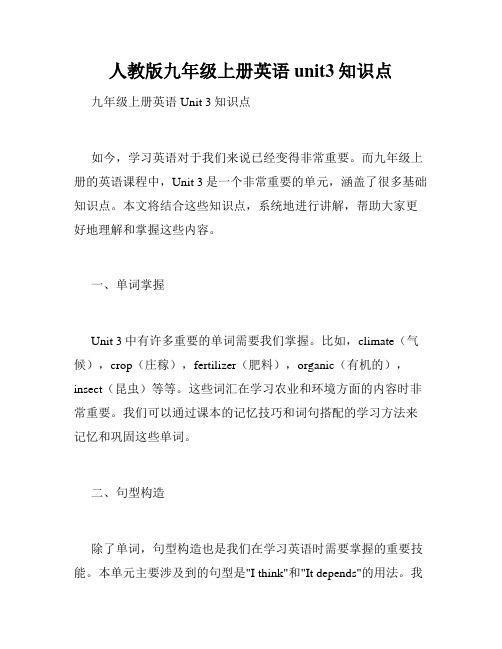
人教版九年级上册英语unit3知识点九年级上册英语Unit 3知识点如今,学习英语对于我们来说已经变得非常重要。
而九年级上册的英语课程中,Unit 3是一个非常重要的单元,涵盖了很多基础知识点。
本文将结合这些知识点,系统地进行讲解,帮助大家更好地理解和掌握这些内容。
一、单词掌握Unit 3中有许多重要的单词需要我们掌握。
比如,climate(气候),crop(庄稼),fertilizer(肥料),organic(有机的),insect(昆虫)等等。
这些词汇在学习农业和环境方面的内容时非常重要。
我们可以通过课本的记忆技巧和词句搭配的学习方法来记忆和巩固这些单词。
二、句型构造除了单词,句型构造也是我们在学习英语时需要掌握的重要技能。
本单元主要涉及到的句型是"I think"和"It depends"的用法。
我们可以通过阅读课本上的例句和语法练习来掌握这两个常用表达方式。
三、课文理解课本上的课文内容是我们学习英语的重要资源。
在Unit 3中,我们需要理解和掌握关于农业和环境保护的内容。
通过课文的阅读和理解,我们可以了解到农业对于气候和环境的影响,以及如何保护环境。
四、语法知识语法知识在学习英语中非常重要。
在Unit 3中,我们主要学习到了被动语态的用法和时间状语从句的引导词。
被动语态的用法需要我们掌握动词的不同形态,并理解不同句子成分之间的关系。
而时间状语从句的引导词则需要我们记忆和熟练使用。
五、听力技巧提高听力技巧是学习英语的重要环节。
在Unit 3中,我们需要通过听力来理解和回答问题。
为了提高听力技巧,我们可以通过多听英语语音材料,如录音和视频,多做听力练习,增强对不同语速和语调的理解。
六、写作技巧写作是英语学习的重要能力之一。
在Unit 3中,我们可以通过写作来表达对农业和环境问题的看法。
为了提高写作技巧,我们可以多读一些相关的文章,积累一些词汇和表达方式,并多做写作练习来提高自己的写作水平。
人教版九年级英语上册unit3知识点

人教版九年级英语上册unit3知识点人教版九年级英语上册Unit 3 知识点Unit 3 是人教版九年级英语上册中的一个单元,主要讲述了关于电视节目的话题。
在这个单元中,学生们将学习到关于各种不同类型电视节目的表达方式,了解观看电视节目的好处和坏处,并且还会学习到如何谈论自己最喜欢的电视节目以及表达观点。
首先,让我们来看一下这个单元涉及到的一些基本词汇和常用表达。
在这个单元中,学生们需要学习和掌握一些与电视节目相关的词汇,例如新闻(N)、体育(sports)、电视剧(TV drama)等。
此外,学生们还需要学会使用一些描述和表达个人观点的词汇和句式,如我认为(I think)、我喜欢(I like)、我觉得(I feel)以及我不喜欢(I don't like)等。
其次,让我们来探讨一下观看电视节目的好处。
对于很多人来说,电视节目是他们休闲娱乐的一种方式。
例如,看电视可以帮助人们放松自己,放松压力。
当人们感到疲倦或者压力过大的时候,他们可以打开电视看看自己喜欢的节目,从而舒缓自己的情绪。
此外,电视节目还可以帮助人们学到新的知识。
比如,有些电视节目会介绍一些有趣的科学知识或者文化背景,观众可以通过这些节目了解到一些以前不知道的事情。
此外,对于学习英语的学生来说,观看英语电视节目还可以帮助他们提高自己的听力水平和语言表达能力。
然而,观看电视节目也有一些坏处。
首先,过度沉迷于电视节目会导致时间浪费。
有些人可能会花费太多的时间观看电视节目,从而忽视了其他重要的事情,例如学习、工作或者社交。
其次,一些电视节目可能会对观众产生不良的影响。
有些电视节目内容可能包含暴力、低俗或者不健康的内容,这些都有可能对观众产生负面的影响,特别是对于年轻人来说。
接下来,让我们谈谈自己最喜欢的电视节目。
每个人都有自己最喜欢的电视节目,可以是新闻类节目、体育节目、电视剧、综艺节目等。
我最喜欢的电视节目是一档娱乐类综艺节目。
(完整word版)人教版九年级英语Unit3知识点精讲及练习题

新目标九年级Unit 3课前检测一、重点1.在旁 ___________2.地,地下的 n&adj___________3.促,急促 n&v ___________4.程,学科 ___________5.工,管理人 ___________6.言者 ___________7.角落 ___________8.建,提 v ___________9.中央的,中心的 ___________10.不礼貌的 adj ___________11.不昂的 ___________12.礼貌地13.不的 ___________14.商,物中心 ___________15.便利的,方便的 ___________16.迷人的 ___________17.方向,方向 ___________二、重点短1.取一些 __________2.握住手 ___________3.,路 ___________4.不起,原我 ___________5.做某事感觉 ___________6.在不同样的 /某些合 ___________7.在某人去⋯的路上 ___________8.依靠 _________9.来,快点,加油 ___________10.引入一个要求 _________11.__________12.期盼 __________13.在主街和中央街的拐角 ___________三、重点句型〔必背句型〕1. Could you please tell me how〔get〕to the post office?2.I wonder where _________ _________ _________next〔.我去哪里〕3.Could you tell us when the band _________ _________ this evening?〔开始演出〕4.It is important to know how〔ask〕for help politely. We also need to learn how to________ __________ 〔 polite〕when we ask for help.5.Good speakers change the way__________________ 〔他的〕 in differentsituations. The expressions they use might depend on whom ________ __________ ________ __________〔他跟〕or how well they know each other.6.Sometimes we even need to spend time________ 〔 lead〕in to a request.7.It might seem more difficult to speak ________〔polite〕than directly. However, it isimportant to learn how to use__________________ ________ ( 合适的言 )in different situations.8.I’m looking forward to __________________〔你的答复〕I’m looking forward to __________________ ________〔收到你的来信〕1四、重点篇Could you please⋯?“ Peter,could you please tell me your e-mail address? 〞or “ Peter,tell me your e-mailaddress. 〞are similar r______ for information. B_____ are correct, but the first one sounds less polite. That is b______ it is a very direct question. Good speakers change theway they speak in different s________. The expressions ________________(depend) on w_____ they are speaking to or how ______ they know each other. A_______ it might seem more difficult to speak politely than directly, it is important _______(learn) how to use the right language.知识梳理一、辨析1.a pair of--- 一;一双;一副 , 其由 pair 的复数决定 . 如: This pair ofshoes is very comfortable.Look! There are three pairs of shoes over there.2.beside, besidesbeside: 介,意“在旁〞besides:1〕介,意“除此之外有----〞, 2〕副,意“而且,有〞A girl is standing beside the tree. 在旁We also like basketball besides tennis.除此之外有 ----I don’tmind carrying these things to your home. Besides, the walk will be good for myhealth. 而且3.seem: 可用作系或意,意“忧如;好似〞,句型构以下:1〕seem + 形容忧如,看起来2〕seem + to do sth.忧如,好似做某事3〕It seems/seemed + that从句看起来好似---,忧如---You seem happy today.Mrs. Green doesn’ t seem to like the idea.It seems thatMrs. Green doesn ’t like the idea.4.suggest (v.) ------suggestion( n) 意“建〞suggest 后跟名或 doing 形式I suggest the restaurant in Water World.I suggested going in my car.二、法接从句 (二)依照引导宾语从句的连接词划分,宾语从句可分为三类:由that 引导的宾语从句、由if/whether引导的宾语从句以及由特别疑问词引导的宾语从句。
人教九年级英语Unit3知识梳理与练习(含答案)
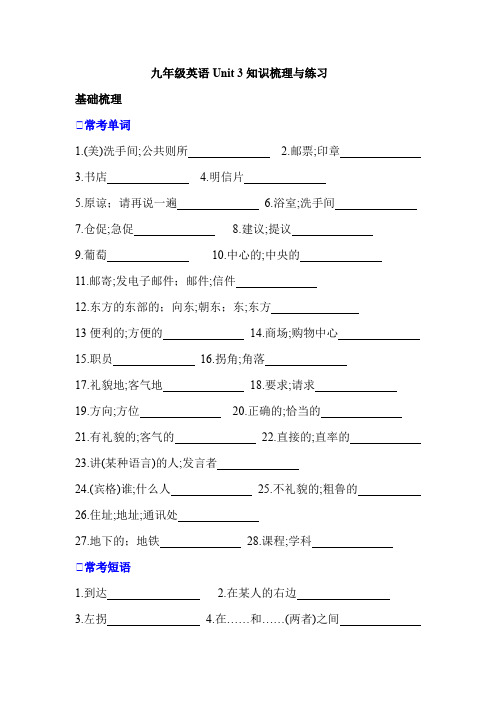
九年级英语Unit 3知识梳理与练习基础梳理◆常考单词1.(美)洗手间;公共则所2.邮票;印章3.书店4.明信片5.原谅;请再说一遍6.浴室;洗手间7.仓促;急促8.建议;提议9.葡萄10.中心的;中央的11.邮寄;发电子邮件;邮件;信件12.东方的东部的;向东;朝东;东;东方13便利的;方便的14.商场;购物中心15.职员16.拐角;角落17.礼貌地;客气地18.要求;请求19.方向;方位20.正确的;恰当的21.有礼貌的;客气的22.直接的;直率的23.讲(某种语言)的人;发言者24.(宾格)谁;什么人25.不礼貌的;粗鲁的26.住址;地址;通讯处27.地下的;地铁28.课程;学科◆常考短语1.到达2.在某人的右边3.左拐4.在……和……(两者)之间5.以…开始6.在那边7.抱歉;对不起;什么;请再说一遍8.需要做某事9.没问题10.在某人去…的路上11.快点;加油12.路过;经过13.告诉某人做某事14.当时;那时15.依赖;依靠;由……决定16.对某人说17.比如;例如18.导入;引入19.和……交流;和…沟通◆常考句型1.Excuse me, tell me get to the bookstore?打扰一下,请问你能告诉我怎样到书店吗?2. Sure, just go along Main Street you pass Center Street.当然,就一直沿着主街道走,直到你经过中心街3. Do you know the bookstore today?你知道今天书店什么时候关门吗?4.Both are correct. but the first one sounds .两种(表达)都是正确的,但第一种听起来不太礼貌。
5. The expressions they use might depend onspeaking to or each other.他们使用的表达可能取决于他们说话的对象以及他们互相了解的程度。
九年级人教版英语unit3知识点
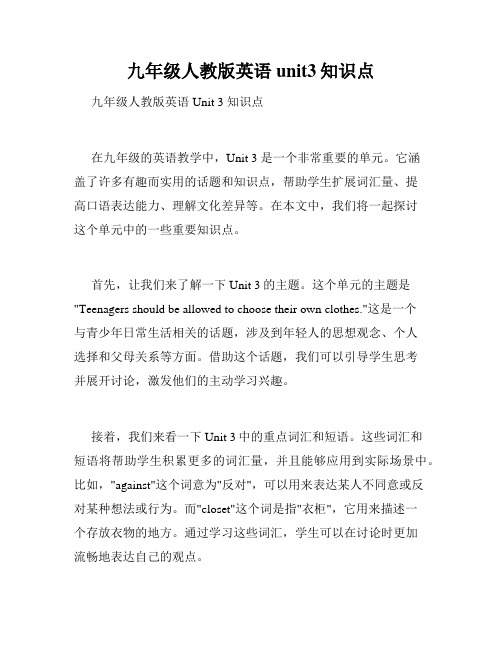
九年级人教版英语unit3知识点九年级人教版英语Unit 3 知识点在九年级的英语教学中,Unit 3 是一个非常重要的单元。
它涵盖了许多有趣而实用的话题和知识点,帮助学生扩展词汇量、提高口语表达能力、理解文化差异等。
在本文中,我们将一起探讨这个单元中的一些重要知识点。
首先,让我们来了解一下Unit 3的主题。
这个单元的主题是"Teenagers should be allowed to choose their own clothes."这是一个与青少年日常生活相关的话题,涉及到年轻人的思想观念、个人选择和父母关系等方面。
借助这个话题,我们可以引导学生思考并展开讨论,激发他们的主动学习兴趣。
接着,我们来看一下Unit 3中的重点词汇和短语。
这些词汇和短语将帮助学生积累更多的词汇量,并且能够应用到实际场景中。
比如,"against"这个词意为"反对",可以用来表达某人不同意或反对某种想法或行为。
而"closet"这个词是指"衣柜",它用来描述一个存放衣物的地方。
通过学习这些词汇,学生可以在讨论时更加流畅地表达自己的观点。
Unit 3中的语法知识点也是十分重要的。
其中,包括目前进行时态、情态动词和被动语态等。
目前进行时态用来描述现在正在进行的动作,它的结构是"主语 + am/is/are + doing"。
例如,"I am wearing a red T-shirt today."这个知识点帮助学生学会在口语和写作中正确运用目前进行时态,提升语言表达的准确性和流利度。
情态动词则用来表达某种能力、可能性、请求等情态。
比如,"You can wear whatever you want."这个句子中的"can"表示"能够"的意思,表达了一种可能性和选择。
人教版英语九年级unit3知识点
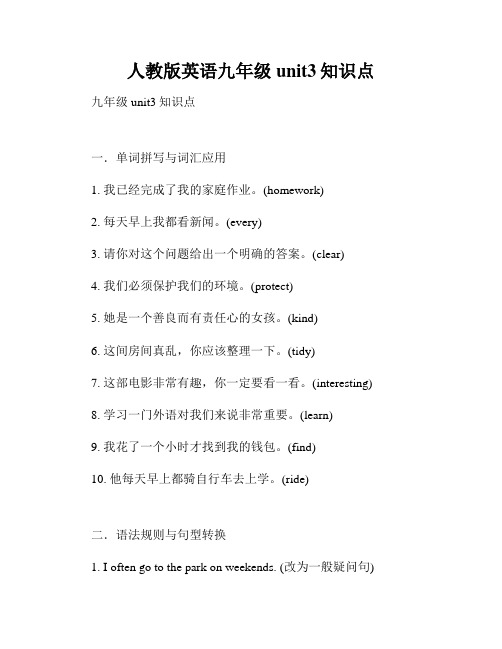
人教版英语九年级unit3知识点九年级unit3知识点一.单词拼写与词汇应用1. 我已经完成了我的家庭作业。
(homework)2. 每天早上我都看新闻。
(every)3. 请你对这个问题给出一个明确的答案。
(clear)4. 我们必须保护我们的环境。
(protect)5. 她是一个善良而有责任心的女孩。
(kind)6. 这间房间真乱,你应该整理一下。
(tidy)7. 这部电影非常有趣,你一定要看一看。
(interesting)8. 学习一门外语对我们来说非常重要。
(learn)9. 我花了一个小时才找到我的钱包。
(find)10. 他每天早上都骑自行车去上学。
(ride)二.语法规则与句型转换1. I often go to the park on weekends. (改为一般疑问句)Do you often go to the park on weekends?2. They have visited Beijing twice. (对划线部分提问)How many times have they visited Beijing?3. She is too young to go to school. (改为同义句)She is so young that she can't go to school.4. We will have a class meeting next Friday. (改为否定句)We won't have a class meeting next Friday.5. It is necessary for us to learn English. (改为感叹句)How necessary it is for us to learn English!6. My sister is good at singing. (改为同义句)My sister sings well.7. 他正在唱一首英文歌。
人教版九年级上册unit3知识点

人教版九年级上册unit3知识点Unit 3 知识点九年级上册的 Unit 3 主要涉及到了现在进行时和一般将来时的基本用法,同时还包括了相关的时间状语和频率副词。
本文将结合一些例句和练习来详细介绍这些知识点。
一、现在进行时现在进行时用于描述现在正在进行的动作或状态。
构成为主语+ be 动词(am/is/are)+动词现在分词(-ing)。
例句:1. I am studying for the exam.(我正在复习考试。
)2. She is cooking dinner in the kitchen.(她正在厨房做晚餐。
)指示词“now” 时常和现在进行时连用,表示现在正在进行的动作。
另外,表示一时刻或眼前动作的副词,如“at the moment”, “right now”等也常和现在进行时连用。
例句:1. Don't disturb him. He is studying at the moment.(不要打扰他,他正在学习。
)2. Can I call you back? I am right in the middle of something.(我可以回电话给你吗?我正在忙着呢。
)二、一般将来时一般将来时表示将来要发生的动作或存在的状态。
构成为主语+ will + 动词原形。
例句:1. They will go to the beach next weekend.(他们下个周末要去海滩。
)2. I will help you with your homework after school.(放学后,我会帮你做作业。
)在一般将来时的句子中,常常会出现以下时间状语:tomorrow (明天)、next week(下周)、next month(下个月)、next year(明年)等。
这些表示将来的时间状语可以帮助我们更准确地理解句子的时间表达。
例句:1. She will visit her grandparents next month.(她下个月要去看她的祖父母。
Unit3知识点归纳2023-2024学年人教版英语九年级全册
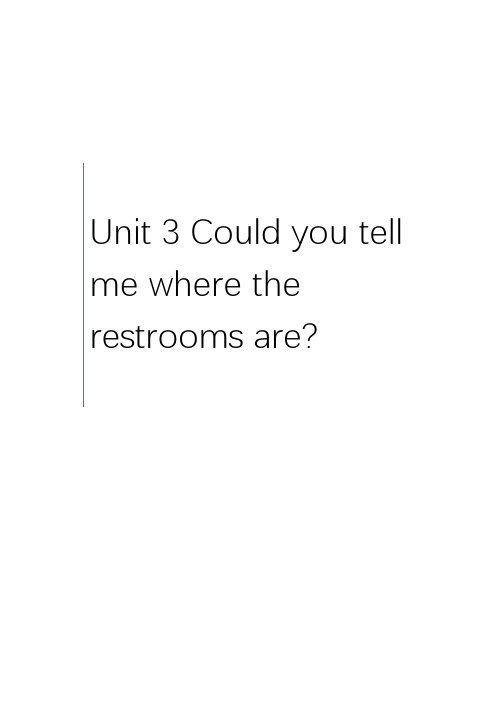
Unit 3 Could you tell me where the restrooms are?Unit3 Could you please tell me where the restrooms are?一、重点单词1. convenient adj. 便利的;方便的conveniently adv. 方便地convenience n. 方便;便利inconvenient adj. 不方便的2. polite adj.有礼貌的impolite adj.不礼貌的impolitely adv. 不礼貌地;粗鲁的politeness n. 彬彬有礼的3. direct adj. 直接的; 直率的v. 指导; directly adv. 直接地director n. 导演; 部门负责人direction n. 方向;方位indirect adj. 间接的indirectly adv. 间接地4. normally adv. 通常;正常情况下normal adj. 正常的; 一般的abnormal adj. 不正常的5. correct adj. 正确的; 恰当的v. 改正;修正correctly adv. 正确地correction n. 改正incorrect adj. 不正确的6. suggest v. 建议;提议;暗示suggestion n. 建议;提议suggest sb. doing sth.suggest (that) sb.(should) do sth.7. fascinating adj. 有吸引力的;迷人的fascinate v. 深深吸引fascinated adj. 极感兴趣的8. inexpensive adj. 不昂贵的expensive adj. 昂贵的expensively adv. 昂贵地9. uncrowded adj. 不拥挤的; 人少的crowded adj. 拥挤的;人多的;挤满的crowd n. 人群v. 挤满;塞满10. central adj. 中心的; 中央的center n. 中心;中央11. nearby adj. 附近的; 邻近的adv. 在附近; 附近near prep. 在…附近adj. 近的adv. 接近;在附近nearly adv. 几乎;差不多12. east n.东方;东adj. 东方的;东部的adv. 向东;朝东eastern adj. 东方的; 东部的13. Italian adj. 意大利(人) 的n. 意大利人;意大利语Italy n. 意大利14. speaker n. 讲(某种语言) 的人;发言者speak v. 说(某种语言);说话speech n.讲话;发言spoken adj. 口头的speechless adj. 无语的;说不出话的15. whom pron. 谁; 什么人who pron. 谁;什么人whoever pron. 无论谁;不管什么人whose pron. 谁的16. beside prep.在…旁边;在…附近besides adv. 而且prep. 除…之外(还)(包括在内)17. staff n. 管理人员; 工人18. request v. 请求; 要求n.请求; 要求19. rush v. 仓促; 急促n. 仓促; 急促20. address n. 地址; 住址; 通讯处21. pardon v. 原谅interj. 请再说一遍22. corner n.角落;拐角23. underground adj. 地下的n. 地铁adv. 在地下24. restroom n. (美) 洗手间; 公共厕所25. washroom n. 洗手间; 厕所26. bathroom n. 浴室; 洗手间27. stamp n. 邮票; 印章28. bookstore n.书店29. postcard n. 明信片30. grape n. 葡萄31. mall n.商场;购物中心32. clerk n.职员二、重点短语1. excuse me 劳驾15. go past 经过;路过2. get to 到达16. e on 快点儿,过来,加油3. get some magazines 到一些杂志17.on one’s way to 在某人去…的路上4. have dinner 吃晚餐18. a little earlier 早点儿19. the shopping center 购物中心5. get some information about 获取有关…的一些信息6. a pair of 一双;一对;一副20. a good place to eat 一个人吃饭的好地方7. on one’s/the right 在右边21. the corner of… …的角落/拐角处8. turn left/right 向左/向右拐22. in different situations 在不同的情况下9. between…and… 在…和…之间23. lead in to 导入;引入10. look forward to 盼望,期待24. on time 准时;按时11.pardon me 什么;请再说一遍25. spend time doing sth. 花费时间做某事12. not…until直到…才…26. thank sb. for (doing) sth. 为(做)某事而感谢某人13. let’s do sth. 让我们做某事吧27. would like to do sth. 想要做某事14. start doing sth. 开始做某事28. look forward to doing sth. 盼望;期待做某事入门测1. 根据句意和首字母提示写出所缺的单词1. When I got up, my brother was taking a shower in the b_______.2.—Where do you live, David?—P_______?I can't hear you clearly.3. There are some differences b_______ the two groups of students.4. Everyone knows that the sun rises in the e_______ and sets in the west.5.——Let's go to the nearest b_______ to buy some books.—Good idea. Let's go.2.单项选择1. The little elephant is afraid to go alone. He always walks______ his mother.A. besidesB. besideC. belowD. under2. Joan and I were free yesterday, so she _______ visiting the museum. And we had a great time.A. stoppedB. finishedC. suggestedD. remembered3.—Excuse me, where is the bookstore?—I'm afraid you just _______ the bookstore. Now, turn back and you can see it.A. ended upB. passed byC. found outD. left for4.—It's too late. I have to go now.—Oh, it's raining outside. Don't leave _______ it stops.A. sinceB. untilC. whileD. when5.—Could you please tell me_______?—Next Thursday morning.A. when we visited the Capital MuseumB. when did we visit the Capital MuseumC. when we will visit the Capital MuseumD. when will we visit the Capital Museum6.——Lucy and Lily are good at acting. I'm sure ______ of them will pass the test of the talent show.—I think so.A. neitherB. bothC. allD. none7.—I won't be too strict with you, but I expect you to do what I wish.—I see, Dad. I'll ______ more time on study and try my best.A. takeB. spendC. payD. cost8. It is very _______ for passengers to use etickets when they are taking highspeed trains.A. peacefulB. basicC. convenientD. natural9.—Will you buy the black car,Mr. Brown?——No. I don't have enough money. I will buy the white one. It is _______ than the black one.A. more expensiveB. the most expensiveC. less expensiveD. the least expensive10.—Could you please tell me _______?—Sure. I bought them in the store next to our school.A. where you bought the shoesB. where did you buy the shoesC. where you will buy the shoesD. where will you buy the shoes知识点精讲1. Sure, just go along Main Street until you pass Center Street.Until 引导时间状语从句,until是连词,意为“直到…为止”e.g. He waited until she had finished speaking. 他一直等到她讲完。
人教九年级unit3单元知识点

人教九年级unit3单元知识点九年级英语 Unit 3 单元知识点在九年级英语课程中,Unit 3 是一个重要的单元。
本文将重点介绍 Unit 3 中的一些知识点,包括动词时态、被动语态以及一些关于语法使用的技巧。
希望通过本文的介绍,可以帮助同学们更好地理解和掌握这些知识点。
一、动词时态在 Unit 3 中,我们需要掌握的动词时态主要有一般现在时、现在进行时、一般过去时以及将来时等。
这些时态在句子中的使用各有不同的用法和表达方式。
例如,一般现在时常用于表达客观事实、习惯性动作等,现在进行时则用于表达现阶段正在发生的动作,一般过去时则用于描述过去发生的事情,将来时则用于表示将来将要发生的动作或计划。
二、被动语态被动语态是九年级英语 Unit 3 中的另一个重点。
被动语态的构成主要是由助动词 be 的不同形式和及物动词的过去分词构成。
被动语态常用于强调动作的承受者,或者当我们不知道动作的执行者时可以使用被动语态。
在应用被动语态时,有些动词可以直接使用,而有些动词需要进行相应的词形变化。
三、语法技巧在学习九年级英语 Unit 3 过程中,我们还需要掌握一些语法使用的技巧。
例如,如何使用形容词和副词来修饰名词和动词;如何使用连词来连接句子和段落;如何使用适当的时态来描述过去、现在和将来等。
这些技巧的掌握不仅可以在 Unit 3 中得心应手,也为同学们今后的英语学习奠定了坚实的基础。
四、词汇与短语在 Unit 3 中,我们还会学习一些与旅行和旅游相关的词汇和短语。
比如,flight(飞行)、hotel(酒店)、passport(护照)、sightseeing(观光)等。
这些词汇和短语的学习可以拓展我们的词汇量,让我们的表达更加准确和丰富。
五、阅读与听力练习在学习 Unit 3 过程中,除了掌握相关的知识点之外,我们还需要进行阅读与听力的练习,以提高我们的综合能力。
通过阅读和听力练习,我们不仅可以增加对语言的理解和应用能力,还可以扩大我们的视野,增长文化知识。
人教版初三英语上unit3知识点讲解及练习(完整资料).doc
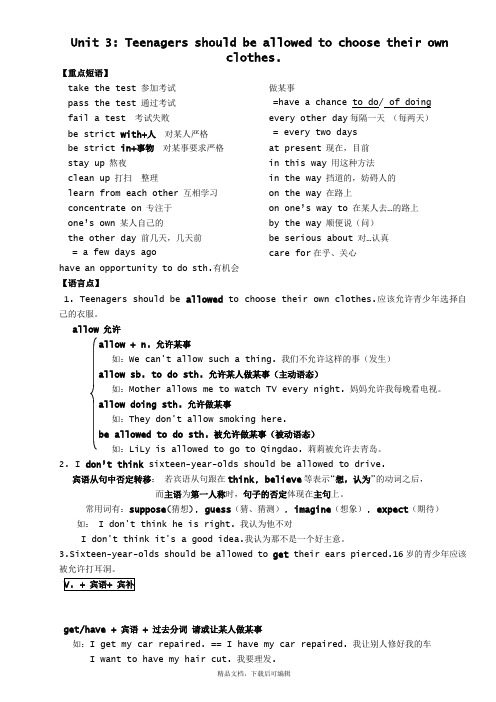
Unit 3: Teenagers should be allowed to choose their ownclothes.【重点短语】take the test 参加考试pass the test 通过考试fail a test 考试失败be strict with+人 对某人严格be strict in+事物 对某事要求严格stay up 熬夜clean up 打扫 整理learn from each other 互相学习concentrate on 专注于o ne’s own 某人自己的the other day 前几天,几天前= a few days agohave an opportunity to do sth.有机会做某事 =have a chance to do/ of doing every other day 每隔一天 (每两天) = every two days at present 现在,目前 in this way 用这种方法 in the way 挡道的,妨碍人的 on the way 在路上 on one’s way to 在某人去…的路上 by the way 顺便说(问) be serious about 对…认真 care for 在乎、关心【语言点】 1. Teenagers should be allowed to choose their own clothes.应该允许青少年选择自己的衣服。
allow 允许allow + n. 允许某事如:We can't allow such a thing. 我们不允许这样的事(发生)allow sb. to do sth. 允许某人做某事(主动语态)如:Mother allows me to watch TV every night. 妈妈允许我每晚看电视。
allow doing sth. 允许做某事如:They don't allow smoking here.be allowed to do sth. 被允许做某事(被动语态)如:LiLy is allowed to go to Qingdao. 莉莉被允许去青岛。
- 1、下载文档前请自行甄别文档内容的完整性,平台不提供额外的编辑、内容补充、找答案等附加服务。
- 2、"仅部分预览"的文档,不可在线预览部分如存在完整性等问题,可反馈申请退款(可完整预览的文档不适用该条件!)。
- 3、如文档侵犯您的权益,请联系客服反馈,我们会尽快为您处理(人工客服工作时间:9:00-18:30)。
Unit3 Could you please tell me where the restrooms are ?短:1. excuse me ,原,打2. get to 到达3. get some magazines 得到一些志4. have dinner 吃晚餐5. get some information about 取有关⋯⋯.的一些信息6. a pair of 一双,一,一副7. on one ’ s / the right在右8. turn left / right向左 / 右拐9. between ⋯ ..and 在⋯⋯.. ..和⋯ ..之10. go past ,路11. come on 快点儿,来,加油12. on one ’ s way在to某人去⋯⋯.的路上13. a little earlier 早点儿14. the shopping center 物中心15. a good place to eat一个吃的好地方16. the corner of的⋯⋯角落. / 拐角17. in different situations在不同的情况下19. on time 准,按20. look forward to 盼望,期待21.pardon me 什么,再一遍短句型:1.not⋯ ..until⋯⋯直到⋯ ..才⋯⋯2.Let ’ s do sth.我做某事吧3. spend time doing sth.花做某事4. thank sb. for (doing) sth.(做)某事而感某人5. would like to do sth.想要做某事6.It seems (that)⋯It seems a rock band plays there every evening.那里好像每天晚上都有演奏。
7___ do you know...Excuse me, do you know where I can buy some medicine?打了,哪里能到?8.Could you please tell me... ? Could you please tell me how to get to the post office?你能告我去局怎么走?9 .1 wonder...I wonder where we should go next.我想知道接下来去哪里。
10.sb. suggest+ 从句The clerk suggests they go to the... museum.工作人建他去⋯⋯ 博物。
知点:1. get a dictionary得到一本字典get v. 得,得到、、到达get sb.sth. = get sth for sb. 某人拿来某物。
get up起床get over克服、恢复get on / off 上 /下get along / on with与⋯ ..相get back 回来,取回2.Go to the third floor.去三楼(美式英)英美英表达楼的不同:美式:on the first / the second /the third floor在一、二、三楼英式:on the ground / first / second floor在一、二、三楼1) The building has ______ floors and our classroom is on the ______ floor.A. four; fourB. fourth; fourthC. fourth; fourD. four; fourth3. ① 路常用的句子:How can I get to ...?Do you know the way to...?Is there ...near here?Which is the way to ...?Where is...?Do you know where⋯is ?Can you tell me how can I get to⋯?Could you tell me how to get to.. .?Could you please tell me how to get to?② Can/Could/Will/Would you please do sth?表示十分客气地事情,用于礼貌地提出求,气委婉,其后跟原形。
1) Could you please ________ us Mary’s telephone number?A. to giveB. giveC. givingD. to giving2)---Could you please tell me where the restrooms are?---____________A. Yes, I can.B. I could.C. Sure.D. I could tell you.3)— Sorry to trouble you, but could you please help me carry this heavy box?— ______. Where do you want to put it?A. Sorry, I can’tB. I hope notC. Of courseD. Good idea4)【2014 重】 --- Could you please tell me ________?--- Two months ago.A. when did you take this photoB. when you took this photoC. where did you take this photoD. where you took this photo4. turn left / right left adv 向左turn to the left / right向左/右left n左turn left / right at the序数crossing/turning在第几个路口向左/ 右on one ’ s right/left在某人右 /左on the right/left在右/左go straight 向前直走go along=walk along=go down/up沿着.....向前走go east/west/norht/south along... 沿着 .....向 /西 /北 /南走: 1) Go straight until you see a museum ______ your left.A. withB. atC. onD. from2)【 2014 遵】–Excuse me, where is the nearest bus stop?--____________.A. I don ’ t want say anythingB. Go straight ahead for 50 metersC.It will take an hour to go there.5.go past=pass past 介pass by 路; . pass v 路;pass1) v. 及格;通 (考 )2) v. ;pass sb sth=pass sth to sbnj ·y·3) v. 去;消逝pass by: 1) I ’m not near enough to reach the book. Can you _______?A. pass to me itB. pass it to meC. pass me to itD. pass it me2)【 2014 烟台 2】— Would you please tell me the way to the Pacific Hotel?— Go ______ the post office, and you will find it on the left.A. passB. pastC. to passD. passed6. Pardon me1)表示歉意,不起= Sorry2)没有听清方的,希望方重复一遍= Pardon?7. rush v. & n. 促;急促rush to do sth.赶着做某事in a rush 促;急促rush off 促离开rush hour(交通)高峰期,刻8. come on 快点= be quick, hurry up 。
come true come up 上升,出come up with提出,想出come out 出来,出版come in 来come back 回来: 1)— The game is too hard for me. I will certainly lose.—You never say no before you try.A. Forget it!B. I’ m sorry.C. Come on!D. Pardon me?2)【 2014 天津】 The book won’ t____ until the end of the year.A. come outB. come overC. come trueD. come on9.suggest v. 建;提名suggestion advice 建①suggest sth 建 / 提某事② suggest doing sth 建做某事③ suggest + that引从句,从句的要用“ should +原形。
give sb a suggestion give sb some advice【注意】建某人做某事不能用suggest sb. to do sth , 可用 advise sb. to do sth.1) The doctor suggested ______ for a walk after supper.A. goB. to goC. goingD. went2)I don’ t know what to wear tonight. Have you got any _____________?3)When I feel anxious, our teacher always ______ that I should listen to gentlemusic.4)— Whom would you for the job?— Tom, I think. He’ s always careful and serious.A. suggestB. remindC. rememberD. explain5)【2014 州】 - What a good _______ you've given me! Thanks a lot. - Mypleasure.A. information B . news C. suggestion D. advice10.on one’ s way在to去......的路上on the way to 在去⋯ ..的路上lose one’ s way迷路in a way在某种程度上in the way路,妨碍某人in this way用种方式,by the way 便一下,便一下例: On _____ way ____ home, Alan and Dick met their good friend Jim.A. their;toB. they;toC. their;/D. I;/11.Excuse me, could you please tell me how to get to the bookstore? 打一下,你能告我怎么去店?how to get to the bookstore属于“特殊疑+不定式”的复合构,作tell 的。
